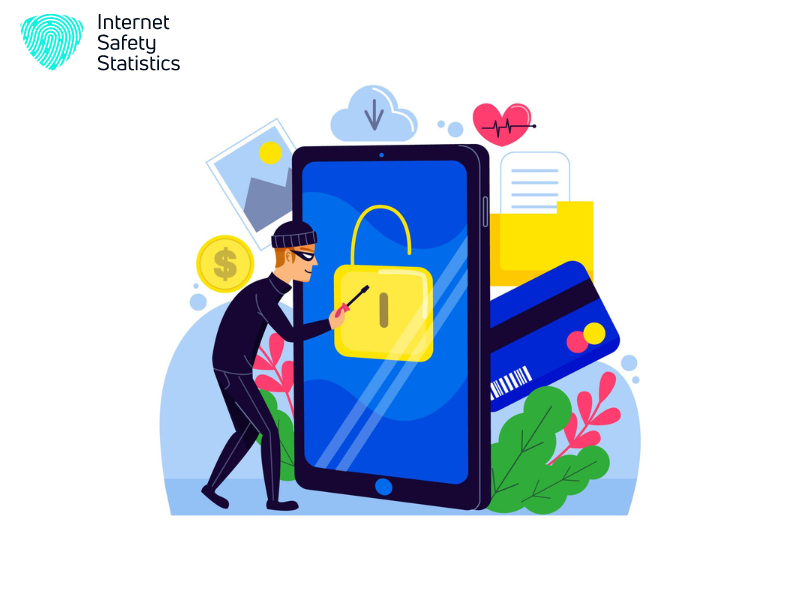
Shopping online can be like navigating a minefield, with scams and frauds hidden at every click. Last year alone, deceptive websites tricked shoppers out of over $350 million. Our guide arms you with essential tips to spot the dangers and shop safely, ensuring peace of mind when buying online.
Dive in for secure shopping secrets!
The Risks of Online Shopping
Scams and frauds are prevalent in the online shopping world, with identity theft being a major concern. It’s important to be aware of these risks and take necessary precautions to protect yourself while shopping online.
Scams and Frauds
Online shopping scams are on the rise, costing Britons over $350 million just last year. Fraudsters create fake websites that look incredibly real, enticing shoppers with amazing deals and discounts.
They aim to steal your money or personal details, so it’s vital you know how to spot them. Always check a site’s authenticity before entering any payment information, and be wary of any deal that seems too good to be true.
Protecting yourself from these online purchase scams starts with smart shopping habits. Research sellers thoroughly to understand their reputation—look for reviews and previous customer experiences.
Use secure payment methods as they add an extra layer of protection against fraudulent transactions. It’s key not to rush into purchases without ensuring that all safety checks have been made – this can prevent disappointment and financial loss in the long run.
Identity Theft
As online shopping scams and frauds continue to pose a threat, it’s vital to be aware of the risk of identity theft. Cybercriminals target personal information such as credit card details and social security numbers to commit identity theft, resulting in financial loss for victims.
Over $350 million was lost due to online shopping scams last year, highlighting the urgency of safeguarding against this type of fraud. Protecting yourself from identity theft is crucial in today’s digital age.
To prevent falling victim to identity theft, ensuring secure payment methods can protect you from potential purchase scams on the internet. Research indicates that using secure payment services significantly reduces the risk of encountering fraudulent sellers while online shopping.
How to Stay Safe Whilst Shopping Online
When shopping online, it’s important to buy from reputable retailers and verify the security of the website before making a purchase. Scrutinise unknown websites and use secure payment services for added protection.
Buy from Reputable Retailers
Purchase from trustworthy vendors to safeguard your online shopping experience. Research the seller’s reputation and assess their track record before making a purchase. Secure payment methods can also protect you from falling victim to fraudulent sellers.
Checking online reviews or seeking recommendations can help identify reputable retailers, ensuring a secure and pleasant online shopping experience.
By choosing credible retailers, you can reduce the risk of falling prey to digital scams and financial loss. Investigating the integrity of the seller is crucial for protecting your finances while navigating the virtual marketplace.
Verify Website Security
Ensure website security by checking for “https://” in the URL and a padlock icon in the address bar. Research the site’s reputation and look for customer reviews before making a purchase online.
Use secure payment methods and avoid entering sensitive information on unsecured websites to protect yourself from potential scams.
Stay safe while shopping online by verifying website security with these simple steps that can help safeguard your personal and financial details from cyber criminals. Be vigilant about where you shop, ensuring websites are secure, reputable, and trustworthy to avoid becoming a victim of internet fraud or scams.
Scrutinise Unknown Websites
After verifying website security, it is crucial to scrutinise unknown websites before making any online purchases. To protect yourself from potential scams and fraudulent activities, conduct a thorough background check on the website’s reputation and customer reviews.
Ensure that the website has secure payment options and a legitimate contact address listed in case you need support or wish to make returns.
Before making any transactions, verify the legitimacy of the website by checking for SSL encryption, looking for trust seals, and ensuring that the URL starts with ‘https.’ Additionally, take extra caution if the website offers products at significantly lower prices than other retailers.
Use Secure Payment Services
Protect your finances by using secure payment services when shopping online. This can safeguard your personal and banking information from potential cyber threats and fraudulent activities.
Always opt for trusted payment platforms that offer buyer protection, ensuring a safe transaction experience.
Secure payment services provide an additional layer of security, helping to prevent unauthorised access to your financial details while making online purchases. By choosing reputable and secure payment methods, you can shop with confidence, knowing that your sensitive information is well protected from potential scams and frauds prevalent in the online shopping landscape.
Red Flags for Scam Emails and Social Media Ads
Be cautious of suspicious email addresses or links, fake discounts and coupons, and requests for wire transfers when shopping online – read on to learn more about how to spot these red flags and stay safe while shopping on the internet.
Suspicious Email Addresses or Links
Watch out for suspicious email addresses or links when shopping online. Scammers often use deceptive emails and fake websites to trick unsuspecting shoppers into revealing personal information.
Be cautious of emails from unknown senders containing strange links, as these could lead to phishing sites designed to steal your data. Always verify the sender’s address before clicking on any links in an email to protect yourself from falling victim to online scams.
Avoid engaging with questionable email addresses or clicking on unfamiliar links received via social media platforms. Cybercriminals frequently target consumers through fraudulent discount offers and coupons sent via email or shared on social media, aiming to lure them into sharing sensitive information.
Fake Discounts and Coupons
Beware of fake discounts and vouchers when shopping online. Scammers often lure unsuspecting shoppers with too-good-to-be-true offers, costing Britons over £350 million last year alone.
Always verify the legitimacy of discount codes and vouchers before using them to protect yourself from falling victim to online fraud. Regardless of how tempting an offer may seem, be cautious and scrutinise any claims of significant discounts or unbelievable deals.
To avoid becoming a statistic in online shopping scams, it’s crucial to stay vigilant when presented with enticing discounts and vouchers. While many legitimate retailers do offer genuine promotions, it is essential to approach all discount offers with a healthy level of scepticism.
By being diligent in verifying the authenticity of these discounts, consumers can protect themselves from potential financial loss.
Requests for Wire Transfers
Beware of requests for wire transfers when shopping online. Scammers often pressure victims to make payments using wire transfers because they are difficult to trace and recover. According to the FBI, wire transfer scams resulted in losses of over $200 million in 2020 alone.
Stay vigilant and never send money via wire transfer unless you are absolutely certain about the legitimacy of the seller or service provider.
Protect yourself from online scams by being cautious of any request for a wire transfer. Always use secure payment methods that offer fraud protection, such as credit cards with chargeback rights or reputable digital payment services like PayPal.
Tips for Secure Online Shopping

Check shipping costs and terms before making a purchase. Avoid storing credit card information on websites and use secure payment services for transactions. Use strong passwords and consider using a password manager to keep your personal information safe.
Check Shipping Costs and Terms
Compare shipping costs and delivery terms before making a purchase to ensure you’re getting the best deal. Learn more about any potential additional charges, such as import taxes or customs fees, that may apply to your order.
Researching these details can save you from unexpected costs down the line, safeguarding your finances when shopping online.
Next up, let’s focus on “Avoid storing credit card information” for added protection against online scams and frauds.
Avoid Storing Credit Card Information
Protect your financial information by refraining from storing credit card details on online shopping platforms. This practice reduces the risk of unauthorised access to your sensitive data, safeguarding you against potential identity theft and fraudulent transactions.
Online shopping scams are on the rise, making it crucial to exercise caution when it comes to sharing personal and financial information.
By avoiding the storage of credit card details, internet users can minimise their vulnerability to cybercrime and protect themselves from falling victim to online fraud. With over £350 million lost to online shopping scams in recent years, it’s essential for individuals to take proactive measures to secure their digital payment safety.
Use Strong Passwords and a Password Manager
Create strong, unique passwords for each of your online accounts. Avoid using easily guessable information such as birthdates or simple words. Use a mix of letters, numbers, and special characters to enhance the strength of your password.
To manage all these complex passwords, consider using a reputable password manager. This software securely stores and encrypts all your passwords in one place, allowing you to access them with a single master password.
Take advantage of password managers that offer features like two-factor authentication to add an extra layer of security to your accounts. Always keep your password manager updated and use its automatic generator feature to create strong, random passwords for each site or service you use.
What to Do If You Fall Victim to an Online Shopping Scam

Report the scam to the relevant authorities and your bank, monitor your credit and bank statements for any unusual activity, and consider signing up for identity theft protection services to safeguard yourself from further harm.
Report the Scam to Authorities
Notify the relevant authorities about the online shopping scam immediately to prevent others from falling victim and to help in the investigation of cybercrime. Provide as much detail as possible, including any communication and transaction records, so that law enforcement can take swift action.
It is crucial to report these crimes to protect yourself and others from fraudsters who exploit unsuspecting consumers.
Monitor Credit and Bank Statements
After reporting the scam to authorities, it’s crucial to monitor your credit and bank statements regularly for any suspicious activity. By staying vigilant and reviewing your financial statements frequently, you can detect unauthorised charges or unusual transactions promptly.
This proactive approach helps in identifying potential fraud early on, preventing further financial harm. Keeping a close eye on your credit and bank statements is an essential practice for safeguarding your finances in the digital age.
Being mindful of online shopping scams and fraudulent activities also means taking active steps to protect yourself by monitoring credit card and banking transactions consistently.
Sign Up for Identity Theft Protection
Protect your financial security by signing up for identity theft protection. This additional layer of security can help safeguard your personal information and finances from the increasing risks of online shopping scams.
With digital protection experts warning about the rise in internet purchase fraud, it’s essential to take proactive steps to shield yourself from potential threats. By enrolling in identity theft protection, you can rest assured that your sensitive data is being monitored and any suspicious activity will be flagged promptly.
It’s important to recognise that online shopping scams have cost Britons over £350 million in recent years, making it crucial for consumers to prioritise their digital safety. By investing in identity theft protection, you are taking a proactive step towards securing your online transactions, protecting yourself from phishing scams and fraudulent sellers.
Conclusion
Online shopping scams are a real threat to your financial security. Researching sellers and using secure payment methods can help protect you from becoming a victim of fraud.
Stay vigilant and follow the tips outlined in this guide to ensure safe and secure online shopping experiences. Understanding the risks is the first step towards safeguarding yourself while making digital purchases.
Always remember to shop smart and stay informed about internet scams and cybercrime.
FAQs
1. What should I do to shop safely online and avoid scams?
To ensure safe online shopping, follow digital security tips like protecting your finances with secure online transactions and learning how to identify signs of fraudulent sellers.
2. How can I protect myself from becoming a victim of online fraud?
Protect yourself by staying informed about common internet scams, using e-commerce security measures, and only purchasing from trustworthy websites with cybersecurity protocols in place.
3. Are there any particular safety tips for preventing banking fraud while shopping on the Internet?
Yes, prevent banking fraud by verifying secure connections before making payments, not sharing sensitive banking details over unsecured networks, and monitoring your accounts for any unusual activity.
4. What are the risks associated with online shopping that I need to be aware of?
The risks include encountering internet purchase scams or falling prey to deceptive websites posing as legitimate businesses—always verify seller credibility and review consumer protection advice.
5. Can you give me some easy-to-follow steps for avoiding fraudulent activities when buying things online?
Sure! Avoiding fraudulent activities involves practising preventative actions such as keeping your software up-to-date, never clicking on suspicious links, and using strong passwords for all your accounts related to shopping sites.
